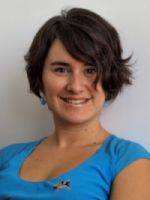Most of us see things that need to change but we don’t know how to go about it. As we walk down the Istiklal Avenue, we see kids selling tissues to survive in the midst of dangerous streets. Some of us stop and give them a few coins, others are even scared to reach for their wallets as it could be a trap to pickpocket. We see garbage dumped in the side alleys of the city, we say to ourselves ‘we will become civilized when we stop littering.’ We see cars driving regardless of the red light, we say ‘no wonder there are so many accidents!’ We sometimes forget to show respect to each other as we need to rush to work, meet a deadline or pick up our kids from school. In the end, we are just trying to survive in this deadly fast environment, aren’t we? Yes, but what do we really miss?
We care less. Or we care but we don’t do much thinking about how we can solve these on-going problems… There are really few people who care and act on them. This minority group is courageous yet determined to execute a detailed plan, raise awareness in the community and change lives of a few less fortunate and maybe the society at large in the long run. They believe in change and they know that the best way to change people is to educate them.
Kardelen Project is a nationwide education project initiated by visionary people who believe in change. Cagdas Yasami Destekleme Dernegi (CYDD – The Association in Support of Contemporary Living) run by Türkan Saylan launched the project in 1997. The aim was to educate girls from rural areas of Turkey. The project started out with only 17 female students. Why female students?
In the underdeveloped rural areas in Turkey, education is not easily accessible for girls. If a poor family has one son and one daughter, it is almost definite that the son will go to school whereas the girl will stay at home to help her mother in household duties. In 1998, the number of girls enrolled in Kardelen reached 237. In 2000, Turkcell took active role in financing the project as a part of its corporate responsibility efforts. In the last decade, the Kardelen project gave scholarship to 20,000 students, 8,666 students graduated from high school, 2,707 were accepted to university, and 755 graduated from university. Kardelen touched the lives of so many girls as well as their families in the rural areas. Education entered the lives of villagers who could not have imagined reading a book or leaving their home village. Kardelen also changed the socio-economic balances in the countryside by educating the girls who can then bring home money just like their brothers. In sum, Kardelen started a nationwide awareness in education by prioritizing girls’ rights to schooling.
Education is key to change. There are different education projects that meet individual needs of people and societies in large. An inspiring education project takes primary schooling needs to the poorest slums of India.
An Indian lady, who served the corporate world for more than 25 years, started a non-profit organization called Parikrma Humanity Foundation in 2003. Her purpose was to educate poor kids from the slums of Bangalore, India. She went to slums to discover how many school age children aren’t going to schools. The number was shocking: 200 million children between 4 to 14 who were supposed to go school were not enrolled in school. Among the more fortunate group who went to school 100 million could not read, 125 million could not do basic maths.
These stats could have intimidated her in the very beginning but she took a different approach. Instead of thinking over the numbers, she focused on one child at a time. She drew an education path for each child for a better living, a high value job. The very first Parikrma school was on a rooftop of a building in the slums. There was no ceiling but 165 children were eager to learn new things. In the monsoon season, they had to wait hours and hours for the rain to stop in order to start classes. Today, she expanded her teaching activities in four schools, one junior college, 1,100 children coming from 28 slums and four orphanages.
This successful philanthropist’s name is Shukla Bose. In the end of her talk at the TED conference, she said that when she started Parikrma schools, her ideal was to transform the world but today she feels that she has been transformed. Just like she had changed lives of kids she had trained, the kids have changed her by their love, compassion, imagination and creativity.
Change comes natural with education. If we’d like to improve our environment, we should find ways to support education programs and enrich others’ lives as well as our own.
 Ela Erozan Gürsel writes a weekly column named “Değişim Yelpazesi ” on global business trends for Dünya Gazetesi on behalf of Datassist for almost two years. Her feature topics include: green energy; climate change; impacts of financial crisis on companies, sectors and regions; innovative technologies in sciences, human resources and management; social networks transforming business and politics; changing dynamics of marketing and branding.
Ela Erozan Gürsel writes a weekly column named “Değişim Yelpazesi ” on global business trends for Dünya Gazetesi on behalf of Datassist for almost two years. Her feature topics include: green energy; climate change; impacts of financial crisis on companies, sectors and regions; innovative technologies in sciences, human resources and management; social networks transforming business and politics; changing dynamics of marketing and branding.
She also writes articles for international magazines published in Singapore.
Prior to her writing career, she worked at Datassist as a Project Manager in a project that combines human resources and mobile communications with the aim to connect blue-collar workers and employers through mobile phones. Before engaging in this exciting project, she was in pharmaceutical sales working for a multinational company. She graduated from American University, Washington, DC, majoring in International Studies with a concentration on International Business and Europe. She worked in Washington D.C. as an Account Manager at a boutique telemarketing firm that specializes in fund raising and publication renewals. She speaks Turkish, English, French, and Spanish. She currently resides in Singapore with her husband.
 Turkish Labor Law
Turkish Labor Law



